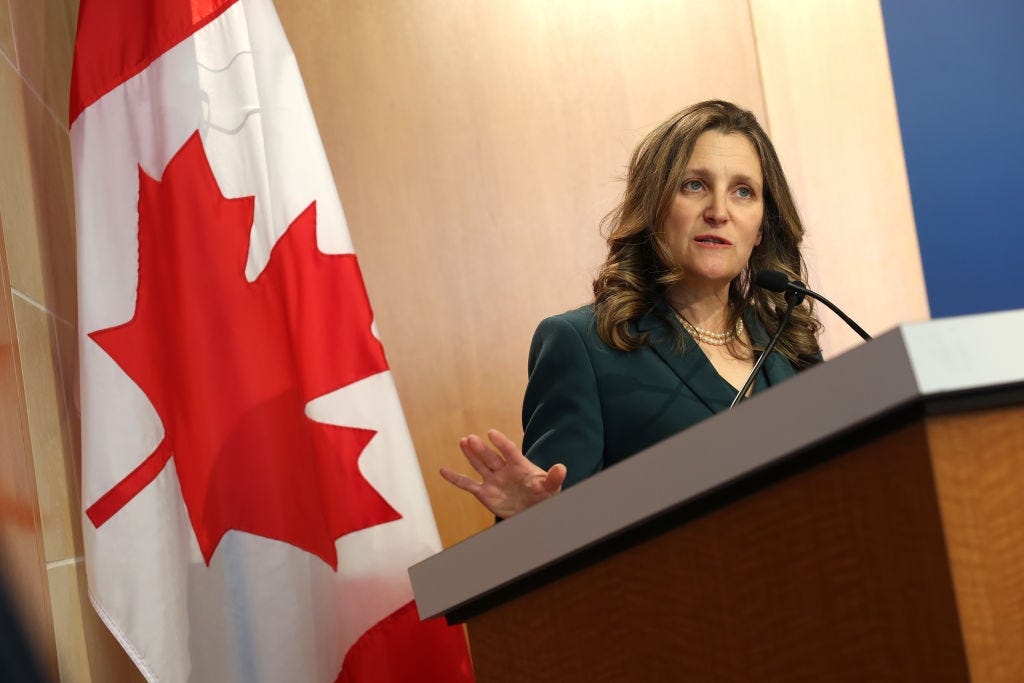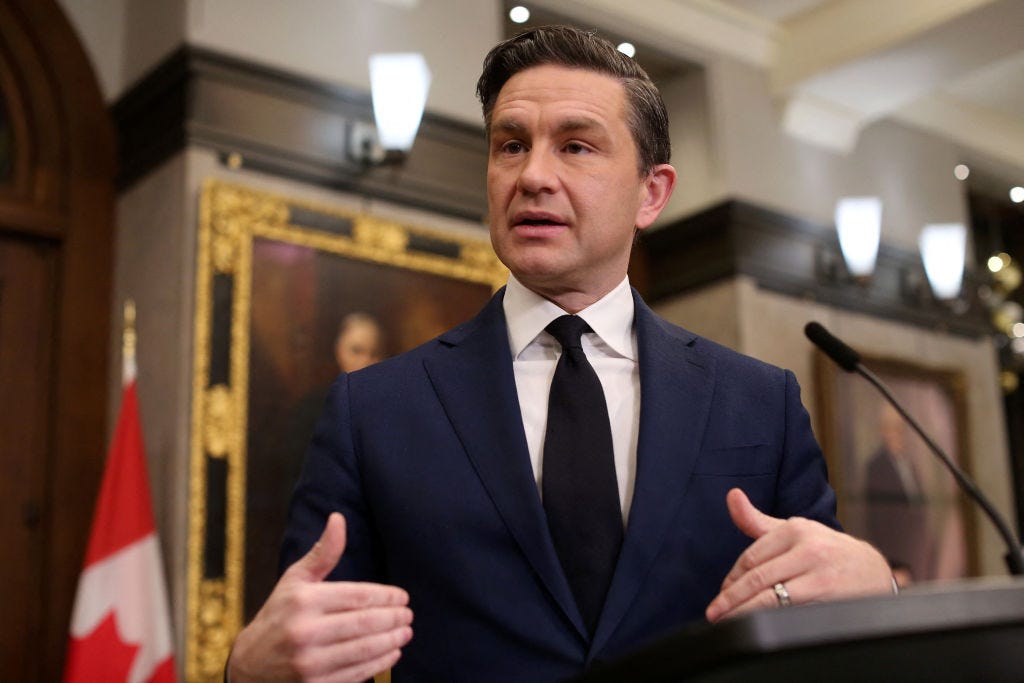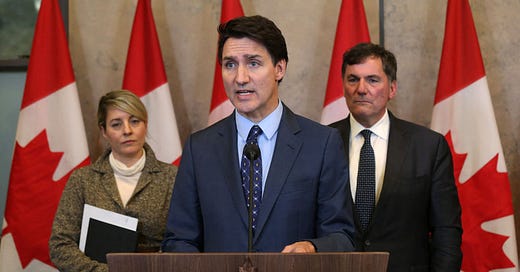
The Free Press

Justin Trudeau’s government could be at the point of collapse. And a social media post from Donald Trump about tariffs may have set off the latest in a chain of dominoes for Canada’s prime minister.
On November 25, Trump posted on his platform Truth Social that, as one of his first executive orders, he would “sign all necessary documents to charge Mexico and Canada a 25% Tariff on ALL products coming into the United States, and its ridiculous Open Borders.” Four days later, Trudeau flew to Mar-a-Lago to meet Trump for dinner. Although the content of their discussion has not been made public, Trump’s tariff threat may have landed a death blow to Trudeau’s cabinet.
On Monday morning, Trudeau’s most important ally—his number two, finance minister Chrystia Freeland—resigned in a fiery letter directed at her boss, which she posted on X.
“Our country today faces a grave challenge,” she wrote. “The incoming administration in the United States is pursuing a policy of aggressive economic nationalism, including a threat of 25 percent tariffs. We need to take that threat extremely seriously.” She continued: “That means pushing back against ‘America First’ economic nationalism with a determined effort to fight for capital and investment and the jobs they bring.”

The same morning, Trudeau’s housing minister Sean Fraser also announced his departure, saying he wanted to spend more time with his family. This brings the total number of cabinet members who’ve resigned under Trudeau in 2024 to nine. But a walkout from Freeland, his most trusted lieutenant, who was expected to release her fall economic statement Monday, is by far the biggest. That such a loyal servant who has worked for Trudeau since 2015 would resign so publicly shows just how deep the rot is these days. Freeland stood by the prime minister as his popularity began to tank in February 2022 when Canadian truckers protested his harsh Covid vaccine mandates. She even authorized the debanking of those protesters, freezing their bank accounts as a means of punishment.
Now, her resignation is feeding feverish speculation that the longtime progressive darling could finally be on his way out, amid his sinking popularity and the country’s economic slump. By Monday night, a prominent member of Trudeau’s Liberal Party, Anthony Housefather, went on TV to say the prime minister is “past his shelf life.”
Though the next federal election is scheduled for October 2025, the House of Commons could pass a motion of no confidence in Trudeau’s government at any time. So far, he has beaten all the odds, governing in a minority position since 2019, and even losing the popular vote in two previous elections. In the last two years, a more left-wing socialist New Democratic Party, led by Jagmeet Singh, has kept him in power. But now, recent polls show that the Conservatives hold a 23-point lead over Trudeau’s Liberal Party, as a housing shortage, rising crime, and an immigration crisis have led to widespread dissatisfaction among voters. For the last 18 months, Canada’s GDP per capita has sunk, hitting young voters especially hard. Thirty-five percent of 18- to 34-year-olds in Canada now say they live at home with their parents.
The situation is so bleak that even basic attempts to appease the masses have failed. Over the weekend, Trudeau’s two-month holiday on the Goods and Services Tax kicked into gear. But that, along with a proposed $250CAD credit to families earning less than $150,000CAD, were shrugged off by most Canadians as a gimmick. A whopping 70 percent of the public called the measures “purely electoral”—simply a way to win votes.
Hours after Freeland resigned, Conservative leader Pierre Poilievre seized his moment, telling reporters in a press conference: “What we are seeing is the government of Canada spiraling out of control before our eyes.
“Eighty percent of Canadians have lost confidence in this prime minister,” he added. “So why is Jagmeet Singh making the entire country wait for him to get his pension? That is the question today.”

Poilievre’s deputy Melissa Lantsman echoed these thoughts to me over text. “The prime minister has completely lost control,” Lantsman told me, adding that his government had “lost the confidence of Canadians.”
By Monday afternoon, Singh called on Trudeau to resign, but he didn’t go so far as to pull the plug on the government, saying that “all options are on the table.” He will likely use his advantage to win more progressive concessions from the prime minister, such as universal pharma care. But Trudeau might have run out of political maneuvers. Though he has already appointed a new finance minister, Dominic LeBlanc, who was also at the meeting with Trump in Mar-a-Lago, his electoral future looks increasingly dismal.
Back in October, two dozen members of his Liberal Party signed a letter urging him to decide by the end of the month whether to resign so they could pick a new leader. He didn’t, of course, and one senior Conservative source told me that Trudeau is unlikely to fall on his sword anytime soon. If he’s true to form, the official said, “he would want more control of how he goes.”
But he might not have that option if Freeland’s scathing torpedo of a resignation is anything to go by. In her letter, she sounded more like an angry member of the public than a government official, decrying Trudeau’s “costly political gimmicks,” and saying that Canadians “know when we are working for them, and they equally know when we are focused on ourselves.”
It all adds up to a hard pivot for Trudeau, who was hailed for his good looks, open mind, and progressiveness toward women, gay people, and minorities when he was first elected in 2015 at the age of 43. After Trump won a second term last month, Trudeau castigated Americans for once again declining to put a woman in the White House, while also reminding the world: “I want you to know that I am, and always will be, a proud feminist.”
But on Monday, Catherine McKenna, a former minister in Trudeau’s cabinet, knocked him for that comment, too. “I’m not sure the PM gets to call himself a feminist,” she said, adding, “The test isn’t what you say. It’s what you do.”
For more reading on Trudeau, see Matt Taibbi’s piece “When Boring People Turn Dangerous: Canada's Insane Power Grab.”



